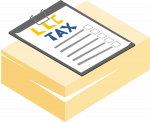Delaware LLC Taxes
LLCs in Delaware are taxed as pass-through entities by default, meaning that the LLC doesn’t pay federal taxes directly. Rather, LLC members pay personal income tax on the LLC’s revenue after it passes through the business to members. LLC members’ earnings are taxed at the federal self-employment tax rate of 15.3% (12.4% for social security and 2.9% for Medicare). Delaware collects an annual LLC tax of $300. Your LLC may also need to pay the Gross Receipts Tax, local taxes, or industry-based taxes.
In this article, we’ll cover:


How Are Delaware LLCs Taxed?
By default, a single-member LLC (SMLLC) is taxed as a sole proprietorship, while a multi-member LLC is taxed as a partnership. As an LLC owner, you’ll pay personal income taxes based on your income level, along with the 15.3% self-employment tax on earnings from your LLC. Here are the forms you’ll need to file your LLC’s taxes under default status:
- Single-member LLC—Form 1040 (usually Schedule C, but some SMLLCs file C-EZ, E, or F)
- Multi-member LLC—Form 1065
If you choose, your Delaware LLC can also be taxed as an S-corp or a C-corp, which changes your tax filing requirements.
Delaware LLCs taxed as S-corp
Filing under S-corp status is beneficial for some LLCs. S-corps don’t have to pay corporate income tax like C-corps. Instead, S-corps are taxed as pass-through entities by default, like LLCs. S-corps pass their revenue on to their owners as distributions, and S-corp owners pay personal income taxes on their earnings. Unlike LLC members, S-Corp owners aren’t subject to the 15.3% self-employment tax on distributions.
To change your tax status to S-corp, file Form 2553 with the IRS. Before filing, make sure that your LLC meets IRS requirements for S-corps. Filing as an S-corp is more complex than filing under default status and doesn’t guarantee that your LLC will save money on taxes. We suggest consulting a CPA before switching your filing status to determine if filing as an S-corp is a good move for your business.
Report your taxes under S-corp status using Form 1120-S
LLCs taxed as C-corp
C-corp filing status, the default tax election for corporations, is another option for LLCs. Although C-corp status is a less common choice for LLCs than S-corp status, filing as a C-Corp can offer advantages to some LLCs. Businesses filing as C-corps are eligible for more substantial tax deductions. Plus, many investors are more likely to provide funds to a C-Corp. On the downside, C-corps are subject to the 21% federal corporate income tax and Delaware’s 8.7% corporate tax rate. Seek advice from CPA before changing your tax status to help ensure that filing as a C-corp will benefit your LLC.
Report your taxes under C-corp status using Form 1120.

Delaware State Income Tax
All LLCs operating in Delaware must pay an annual tax of $300 to the Delaware Division of Corporations, due on or before June 1st every year. This tax can be paid through the Delaware Corporations Information System online portal.
Delaware doesn’t collect income tax from LLCs directly. Still, all LLCs filing federal taxes under partnership status must report their income to the state by filing Form 300 with the Delaware Division of Revenue. Similarly, LLCs filing as S-corps must report their income using Form 1100S.
Personal tax income rates in Delaware are graduated from 2.2% to 5.55% on income over $2,000 and under $60,000. All individuals who make over $60,000 a year pay a max rate of 6.6%. You can calculate your tax amount using the Division of Revenue’s most recent Income Tax Table.
|
Taxable Income, Filing Separate |
Taxable Income, Filing Jointly |
Delaware Personal Income Tax Rate |
|
$0 – $2,000 |
$0 – $2,000 |
0% |
|
$2,000 – $5,000 |
$2,000 – $5,000 |
2.2% |
|
$5,000 – 10,000 |
$5,000– $10,000 |
3.9% |
|
$10,000 – $20,000 |
$10,000 – $20,000 |
4.8% |
|
$20,000 – $25,000 |
$20,000 – $25,000 |
5.2% |
|
$25,000 – $60,000 |
$25,000 – $60,000 |
5.55%% |
|
$60,000 or more |
$60,000 or more |
6.6% |
If your LLC is filing taxes as a C-corp, your business must file Form 1100. Delaware’s corporate tax rate is 8.7%.
You can learn more about your taxes through the Delaware Division of Revenue and pay taxes online using the Delaware Taxpayer Portal.

Gross Receipts Tax
Delaware doesn’t charge sales tax, but there is a Gross Receipts Tax for all businesses that sell tangible and intangible goods or provide services. The Gross Receipts Tax rates range from .0945% to .7468%, based on the type of business activity. You can find the tax rate that applies to your LLC by searching for your business activity using the Division of Revenue’s Business Tax Tips page.
Depending on how much your business makes, Gross Receipts Tax returns are due either monthly or quarterly. By default, all businesses are initially placed on a quarterly payment schedule. The Division of Revenue will determine whether you remain on the quarterly schedule or move to a monthly schedule after reviewing your business activities.

Local Delaware Taxes
Some local municipalities in Delaware collect additional local business taxes. For example, Wilmington charges a City Wage Tax that requires anyone living or working in Wilmington to pay 1.25% of their gross wages to the city. In addition, if your LLC owns any property, you may also need to pay property taxes. Check with your local municipality to determine which local taxes apply to your business.

Other Taxes in Delaware
Your LLC may need to pay additional taxes based on your industry and whether or not you have employees.
Delaware State Employer Taxes
As an employer, you’ll need to pay unemployment insurance and workers’ compensation taxes:
- Unemployment Insurance (UI) Tax—Employers in Delaware must pay UI tax on the first $18,500 of their employee’s wages. UI tax rates range from 0.3% to 8.3%. The rate for new employers is 1.8%. You can find your exact rate after registering with the Department of Labor using the Online Employer Services Portal.
- Workers’ Compensation—Delaware businesses with one or more employees are required by law to provide those employees with workers’ compensation insurance. Rates for workers’ comp vary depending on the level of risk involved with the work your employees perform and your claims history. You can purchase workers’ comp through a private insurer or through the Delaware Insurance Plan if you are unable to obtain coverage through a private insurer.
Industry Taxes
The Delaware Division of Revenue collects taxes from businesses in certain industries, including:
- Alcoholic Beverages Manufacturer’s Tax
- Cigarette/Tobacco Tax
- Occupancy Tax
- Petroleum Wholesaler’s Tax
- Realty Transfer Tax
Determine which (if any) industry taxes apply to your LLC using the Division’s Business Tax Tips page.

Do foreign LLCs in Delaware need to pay Delaware taxes?
Yes. If you own an out-of-state LLC that has registered to do business in Delaware, your Delaware foreign LLC will be required to pay all applicable state and local Delaware taxes. This includes the annual LLC tax and the gross receipts tax.





